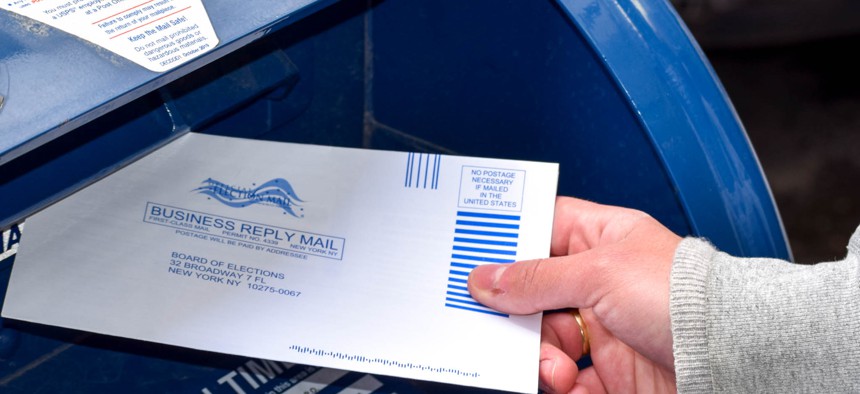Opinion
Thousands of detained New Yorkers are eligible to vote. Few likely will.
A lack of reporting and adequate voter assistance materials that plagues jail facilities throughout the state leaves doubts that many incarcerated individuals will cast ballots in the upcoming primary elections

Debra Gerth
In the midst of New York’s elongated primary season, the issue of inadequate voting rights preservation for those in jail is gaining traction – in New York City. Earlier this year, over fifty New York City advocates and political representatives sent a letter to officials in the Mayor’s office and city agencies, calling attention to the issue and asking for solutions.
While the term ‘felony disenfranchisement’ is now nearly commonplace, there remain an estimated 746,000 jailed, eligible voters nationwide who are awaiting trial, awaiting conviction or, in 44 states, serving a misdemeanor sentence. Although these individuals already retain the right to vote, their civic participation is frequently obstructed by a criminal legal system that is unprepared to assist them.
The New York City advocates’ letter attests that the Department of Corrections has not met election accessibility requirements. According to Anthony Posada, a supervising attorney for the Legal Aid Society’s Community Justice Unit, “although we were being told by the [DOCCS] that they had done a significant amount of outreach and had provided people with materials to vote … we actually found that was not the case.”
While this call to action is an important step towards progress, it misses a larger picture, one that expands beyond New York City and across the entire state. According to research I conducted over the past year regarding voter turnout among those detained in New York jails, a lack of adequate voter assistance materials, for instance, plagues jail facilities throughout the state.
Roughly two-thirds of New York’s jailed population is housed upstate. And yet, it is virtually impossible to know exactly how many detained individuals in New York are voting-eligible, or even more noteworthy, how many ultimately vote during detainment. This is because no county agencies, that I found, monitor the civic participation of jailed populations, and no prior research has addressed this question.
From a random sample of counties representing more than 1,100 voting-eligible individuals detained outside of New York City, I determined that only 24 people cast a ballot in the 2020 Election – a turnout rate of 2.06%. Because these data did not already exist, these findings required that I manually sort, match, and analyze records from county Boards of Elections and county jails. The kind of reform to report the numbers of eligible and actual voters in jail, which has been suggested for New York City, needs to apply to the entire state.
There is also evidence that a lack of civic participation among detained individuals is not indicative of civic disinterest. Rather, in an interview with one jail official in a sampled county, he “would probably say no,” when asked if individuals detained in the facility were aware of their eligibility to vote. A representative from another county’s jail similarly recalled that many “don’t understand that they can register” to vote during detainment. One official attributed confusion around eligibility to the misconception which has “been in everybody’s head forever that…once you’re a felon you can’t vote.” But not everyone in jail is a ‘felon.’
Even among corrections staff themselves, my research uncovered that knowledge of detained voter eligibility varies alarmingly by county and officer. In one county, where there were zero known detained voters in the 2020 Election, the interviewed official affirmed that jail administration “absolutely” knew that the detained population had the right to vote. He did, however, agree that training from the Board of Elections could be helpful since “there really is nothing at this point that [he] know[s] of.”
In another sampled county, the jail representative estimated that only one-third of corrections officers were aware that detained populations retain the right to vote. Perhaps unsurprisingly, no one voted from the facility in the 2020 November Election. This kind of extreme disparity threatens to dictate the quality of election assistance provided to detained voters, depending simply on the particular person they ask for help.
As a potential lesson on how to improve awareness, at one jail, officers facilitate basic election assistance and collaborate with the county board of elections to develop broader educational materials. This partnership began in 2020, after corrections officers observed that the detained population “doesn’t necessarily trust these [voting] forms are making it to the board of elections.” In 2019, only six people requested voter registration or absentee forms. One year later, 33 detained individuals were issued absentee ballots for the 2020 Election – a five-fold increase – in tandem with involvement from the board of elections.
Civic education workshops, both for detained individuals and jail officials, should be considered essential to fostering awareness and representation in our civic democracy. While organizers propose in-person poll stations for the 5,000 detained on Rikers Island, this potential solution is far less realistic for upstate facilities with a detained population of, in some cases, fewer than 50 or 100 people. Instead, training led by board of elections representatives presents an alternative, without sacrificing access to informed poll workers and election officials.
Likewise, the inattention of county agencies to the voter activity of detained populations inevitably contributes to lower turnout and misinformation. Elected representatives and advocates in New York City urged the Board of Correction to request and report data on the number of registration forms or absentee ballots requested and issued. This does not go far enough.
Our state leaders should consider legislating a formal collaboration between the BOE and jail facilities and institutionalize expansive election assistance procedures. The current decentralization is unfair to the already overburdened corrections staff blindly entrusted to oversee voter assistance, but above all, it is unconstitutional, as it harms the civic rights of a whole population of potential voters.
Madalyn Stewart is a recent graduate of Fordham University Lincoln Center on the Pre-Law track with a double major in Political Science and French Studies.

